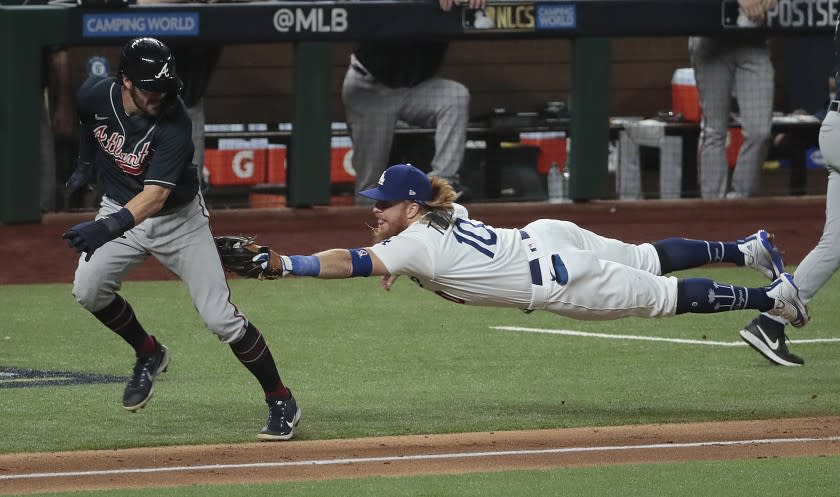Justin Turner's Superman play crucial for Dodgers in NLCS Game 7 win

- Oops!Something went wrong.Please try again later.
Justin Turner went for it all.
With Atlanta Braves runners at second and third, and one run already across with no outs in the fourth inning of a Game 7 the Dodgers were trailing 3-2, Turner could have conceded a run when Nick Markakis grounded a ball to him at third.
Instead he threw home without hesitation.
When catcher Will Smith tossed the ball back to Turner, his initial decision having caught Braves baserunner Dansby Swanson in a rundown, he could have again made the easy play and waited for Swanson to run out of space.
Instead, he produced the latest season-saving moment in the Dodgers’ season-salvaging National League Championship Series three-games-to-one comeback, creating a turning point from thin air that helped flip momentum in the team’s eventual 4-3 pennant-clinching win at Globe Life Field.
Turner dived Superman-style, his body parallel to the ground, to tag Swanson on the back. Had he missed, Swanson might have been able to score, the Braves would have gone ahead by two and there would have still been no outs in the inning.
Instead, the 35-year-old infielder, who is in the final year of his contract with the club, grazed Swanson’s backside with his glove. Then, in a motion as fluid as his rhythmic swing, Turner got to one knee, turned around and fired a bullet to third base, where shortstop Corey Seager was covering the bag and tagged out the Braves’ Austin Riley trying to advance on the play.
“That was huge,” right fielder Mookie Betts said. “I didn’t even see the backside play. Once he dove and made the tag, I thought the play was over.”
At first, so did Seager. Riley had initially held at second on contact and didn’t break for third until Turner went for the tag. Seager saw it and covered the bag but didn’t even call to Turner for
the ball. It turned out, he didn’t need to.
“JT’s a baseball savvy guy,” Seager said. “He sees the field so well.”
According to Baseball Prospectus, a second-and-third-with-no-out situation last season resulted in an average of almost two runs. Even one more Braves run might have been too much to overcome.
But, instead once again, they came away with nothing more, Cristian Pache grounding out in the next at-bat to end the inning and keep the Dodgers’ deficit at one.
“For him to have the presence of mind to make a diving tag and throw the guy out at third,” Betts said, “that’s huge.”
An inning later, Betts supplied similar heroics.
Moments after the Dodgers had left the bases loaded, Freddie Freeman skied a high fly ball deep to right. He picked the wrong corner of the outfield.
Because, just as he had done a night before to Marcell Ozuna, Betts went back on the ball, positioned himself in front of the fence, then practically pogo-sticked off the ground, this time sticking his glove above the barrier to bring back what would have been a home run.
“Today is probably my favorite,” Betts said when asked which of his web-gem grabs in this series was the best. “Since it was actually a home run.”
Betts’ and Turner’s plays saved at least two runs, and quite possibly a few more, keeping the Dodgers close enough to pull off the comeback later in the night behind solo home runs from Kiké Hernández and Cody Bellinger.
“Getting that double play right there started it,” manager Dave Roberts said of Turner’s effort.
It was the epitome of the Dodgers’ do-everything, win-in-any-way-possible ethos. Because for all the power, all the pitching, all the preeminent talent that dots their roster, they needed to produce in the field too — simple plays and highlight-reel catches alike.
After the team committed a pair of errors and missed chances to bail themselves out of jams defensively during Thursday’s Game 4 loss, they committed just one error over the series’ final three games. As Julio Urías closed out Sunday’s final three innings, the pitcher didn’t record one strikeout. All nine outs required his teammates to turn a play.
And they did, with Bellinger — despite appearing to hurt his shoulder while celebrating his go-ahead home run earlier in the night — ending the game by hauling in a routine fly ball in center field and setting off a celebration that, without Turner’s and Betts’ crucial defensive plays, might have never taken place.
This story originally appeared in Los Angeles Times.
